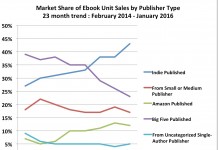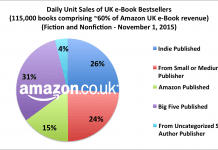 Probably my favourite assignment for Teleread this year was having a chance this week to sit down this week and talk shop (for over two hours!) with Michael Serbinis, the CEO of Kobo Books. I got to sample the Kobo app for iPad in its full big-screen glory, got my hands on a demo model of the new Kobo Reader, and had all my ebook questions answered, straight from the top.
Probably my favourite assignment for Teleread this year was having a chance this week to sit down this week and talk shop (for over two hours!) with Michael Serbinis, the CEO of Kobo Books. I got to sample the Kobo app for iPad in its full big-screen glory, got my hands on a demo model of the new Kobo Reader, and had all my ebook questions answered, straight from the top.
I had been a long-time Fictionwise customer and watching the decline in their customer service over the last year has really been sad for me. I was feeling like an early ebook pioneer had either stopped getting it, stopped caring or both. Kobo has brought some fresh new energy into the ebook scene, and I have since become a loyal customer.
I think I’ll be even more loyal now that I have met Michael and heard more about his vision for the company. I really think Kobo gets it, and I am excited to see what new products and services come our way from them and what innovation they challenge their competitors to bring to market.
MESSAGE NUMBER ONE: DON’T PANIC
I began by recapping for Michael a little bit about my background, from my involvement with Teleread to my involvement with ebooks in general. I have bought several hundred ebooks over the years and spent about $1000, so I was speaking to him as a customer first, and a depressed customer at that.
The whole agency fiasco had me worrying that publishers were trying to kill the ebook business outright, and Michael hastened to reassure me that there is no nefarious plot. Publishers are simply scrambling to keep up with an industry that’s changing quickly.
He told me that when he first started meeting with publishers, they were suspicious and the ebook division was pretty much a ragtag bunch of techies in the basement. No so, now. The big publishers have major ebook divisions and have been much friendlier in their meetings. And they do want ebooks to succeed—they’ve already been sending in price adjustments to the new agency-priced books as they see what other publishers are offering and gauge the customer response.
It may take a couple months to get the system running smoothly, but he assured me that the major vendors—and publishers—see that this is the future and are on our side.
ABOUT GEOGRAPHICAL RESTRICTIONS
On the topic of publisher issues, I asked as well about geographical restrictions. Many readers have been frustrated by the issue, especially when it kicks in at the moment they have a book in their shopping cart and try to buy it. Michael said Kobo takes this issue very seriously and has been implementing filters on their site so that customers can only browse the content available to them.
Anecdotally, this seems to be true. I sent the title of a Canadian novel to Paul Biba in the US and asked him to check it for me. He found it at Amazon, but didn’t see it on the Kobo site, whereas I (back in Canada) obviously did.
So how does Kobo determine geography? Michael told me they use IP-based filtering—unless you are a registered customer. So if, for example, I browse from my sister’s computer while visiting her in California, and I don’t log into my customer account, the site will view me as an American based on her IP address and only show me content available to that country.
But if I actually log into my account, I can purchase Canadian content at Canadian prices, and see content available for Canada even if I am traveling becuase if you have an account, this is the information it uses.
Michael does not see the geographical restriction issue easing soon—he told me that as a purist he thinks it should go, but as a pragmatist, he is doubtful it will because authors can often get a more lucrative deal by splitting up the rights and selling them separately. He confirmed my suspicion that it’s the agents who are the real bad guys here, and they are the ones we should be hounding if we want to see this changed!
THE FUTURE OF THE KOBO STORE
The team at Kobo is rolling out new or improved software later this month for iPhone/iPod Touch, Mac and PC, even a special version optimized for netbooks. But what good is software without a decent store from which to purchase content?
Michael filled me in on some plans underway for the Kobo store, including social networking features, more editorial content to supplement the Tuesday/Friday content additions, a new newspaper and magazine section and the return of coupon codes in a new fashion that he said even exclusive interview me would have to wait and see!
We spoke a little about the search engine. It’s not as precise as those on some other sites, and some readers were finding themselves overloaded with search results. He explained that this is the different between a live store and an on-line one. In a live store, most people are browsers. They come in just wanting to go to the bookstore and see what’s there.
On-line shoppers tend to know exactly what they want and to look specifically for it. So they focused on getting a general search engine up to drag all the nets, so to speak. Now that it’s underway, they do plan future refinements.
I asked as well about gift cards. I know Kobo has plans to roll out their own, but many customers had wished for the ability to use gift cards from the bricks-and-mortar parent company, Indigo Books. The big news here was that plans are underway to not only support Indigo gift cards (yay!) but also to support gift cards from other retail partners who plan to sell the reader too.
Borders will be carrying the reader in the US, and the Redhat Group will be carrying it in Australia, New Zealand and Singapore. So customers of those stores should be eventually able to spend those gift cards as well.
A BOOKSTORE FOR THE WORLD
In light of this international focus, I wondered if Kobo planned to de-emphasize its roots as a Canadian company. Michael’s answer was that while they are of course trying to position themselves as a general market leader regardless of country, they do recognize the importance of local markets.
Canadian content will definitely be a priority when viewing the site from Canada, and as the site is localized for other markets, those viewers will see content specifically targeted to them. I think this is a really intriguing business model.
He mentioned for example that some of their Canadian content is coming from a partnership with the Association of Canadian Publishers. If they strike similar deals with the equivalent agencies in other countries where they localize (for example, in Australia, New Zealand and Singapore, where stores under the Redhat umbrella plan to sell the reader) then that could greatly expand the content offerings for readers in those countries.
I do think no geographical restrictions is the way to go; I spent a year in New Zealand and might want to keep up with some of the authors I read there, in addition to the Canadian stuff—but I do think that, given this is out of Kobo’s control, it is an excellent first step to say ‘we will prioritize local content’ and let Canadians (for example) have access to great Canadian books. Certainly, none of the other America-based on-line stores seem to be selling them!
Michael was so helpful and friendly. He really struck me as someone who cares about reading and is prioritizing customer service. He said on his own blog that in this age of agency pricing, where bookstores can’t compete on price, they’ll have to compete on service and customer experience.
I think he has taken this to heart and is focusing on improving the site, adding new features and support for new devices, and on both increasing the level of content and on customizing it to suit each market. This is a smart plan.
There is work to be done, of course. A lot of work, both for Kobo and for the industry as a whole. But I came away feeling more optimistic about the future of the book industry than I had in weeks. It did reassure me to hear from someone in the know that there is no wish to kill the growing ebook market and that everyone is interested in getting things running smoothly.
I’ll be back later in the week with a detailed look at the Kobo Reader device, and some comments on the iPad app.


































Did you ask him about making a deal with Canadian telcoms re: 3G connectivity for the Kobo Reader?
Sure would make buying books, etc. alot easier than without. That’s one thing Amazon got right. And, depending on what you want to read I would have to say Amazon has a much bigger selection than Kobo.
I didn’t ask about 3g. I don’t see it being a feature in *this* Kobo Reader because I really think they are aiming for ‘simple, basic’ with it, but I know they are considering future projects and a full line of readers with varying options is a possibility.
Your little qualifier ‘depending on what you read’ is a big one. Of the last 5 Canadian titles I bought, only 2 were available at Sony. And the ones available at Amazon are alas Kindle-only. Kobo is doing the right thing backing the epub standard, It think.
Very nice article, Joanna! I’m going to put a link to it on our new Writing Show forum (http://forum.writingshow.com) and also on Facebook.
Great article, and quite inspiring. I still have one lingering question about the Kobo reader, which is what kind of PDF support it will offer. I am likely buying an ereader in the near future, and that will be a deciding factor for me.
I saw you answered my question in your last entry, so ignore my comment here. Looking forward to the full review.
Thanks for this!
The geo-restrictions aren’t something the sellers can fix: they are determined by the author and the deal he/she signed with each book. Often, an author gives “world rights” to a publisher — who then sells those rights regionally to maximise profits. Nothing wrong with that … but it means the author and original publisher no longer “control” the book / e-book outside of the original market. It’s incredibly frustrating for consumers … especially when paper and e-rights don’t seem to match.
I would be rather more severe in the appraisal of Kobo’s (or Sony’s or Fictionwise’s) online store and the searchability within. Zeroing in on a specific title / author; seeing related suggestions of “you might also like”; viewing a robust, engaged community viewpoint … HEY!, is anyone listening? … these are not “nice to haves” … these are table stakes.
Amazon has set the barre very, very high: their back-end database and front-end customer facing view is very friendly, making it easy to browse, simple to save a wishlist, hold a selection in a shopping cart, and actively participate. Yes, they offer mobi drm only … but each of us can only read one thing at a time and if W, X, Y isn’t available … Z is there to read in the meantime. And the reality is Amazon can deliver X and Y as well.
Kobo has to be at the top of their game … matching Amazon point-for-point — at minimum. A half price reader isn’t quite good enough if the device lacks easy purchase delivery; lacks a dictionary; lacks a great store experience. Let me download the sample and read it on the device … it’s then so tempting to press “buy”, isn’t it?
Alexander: yes, we spoke about the wishlist, related suggestions etc. and all of these are underway. As for things like dictionary and direct downloads while on device, those are matters of opinion. Some people don’t want or need those features (I know that if I did not read in French and need a dictionary for that, I would never use the dictionary feature on my Kindle). Clearly, Kobo has made a choice to *begin* with an entry-level reader. That doesn’t mean it’s the only product they will offer. And I do think many people *are* being priced out of the market right now, so an entry-level budget reader might be a serious game-changer. We’ll see how things evolve from there, both for Kobo and its competitors. Personally, I need the text to speech because of how/where I use my Kindle. But the Kobo is a nice reader too and I can definitely find uses for a second reader in my house!
Cool! Thanks for the quick response!! The dictionary thing isn’t just for learning a second language … Kindle has implemented this very elegantly for native English speakers … esp. for those reading lots of Victorian-ish era PD books with slang trapped in time … Dr John Evelyn Thorndyke, anyone? 🙂
Buying on the spot … and the free samples delivered direct to the device (seamlessly over 3G) … I really think that is a much bigger deal than Kobo (or Sony or Apple) is willing to admit. It’s a very powerful selling tool.
That said, there IS room for an entry level device … but it has to be backed by an online store experience at least on par with Amazon — the gold standard. What an intense pity it does not support non-drm mobi.
Three cheers for Kobo and another cheer for their (reluctant?) Canadian-ness … but, really, Kobo can’t shoot for “second reader in the house”. Imagine if that were the target of excellence Steve Jobs set for iPad … !!!
Can’t agree more with what Alexander says. Joanna I think Kobo misses the mark.
Alexander nailed it on the head when he says:
“Buying on the spot … and the free samples delivered direct to the device (seamlessly over 3G) … I really think that is a much bigger deal than Kobo (or Sony or Apple) is willing to admit. It’s a very powerful selling tool.”
Price must be matched with convenience.
What do Kobo want to sell: ebooks or devices?
Combine them like Amazon did.
Kudos to Amazon.
I think a built-in dictionary is essential.
I am waiting for the 2nd version.